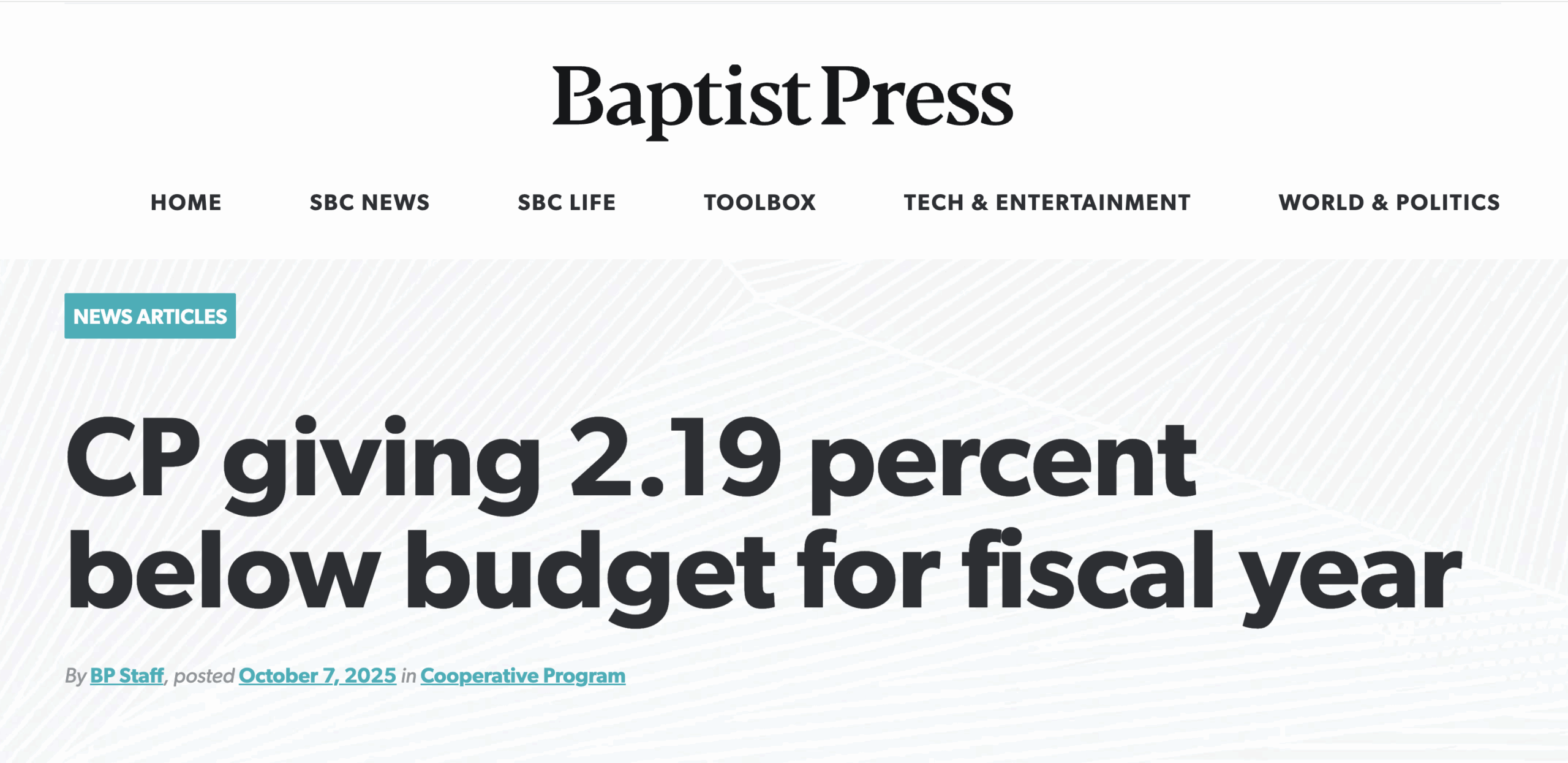It's time for Dr. Iorg to Resign
A few weeks ago, while I was driving to the office at my church, I heard a faint hiss from under my truck’s hood. Just enough to notice, but not enough to cause worry, before it stopped. A few miles later, the “check engine” warning light lit up. When that came on, I thought I could get the code checked at my friend’s shop (which happened to be on the way). But just another mile down the road, steam started billowing from the hood.
The radiator was shot.
At that point, I had no choice but to pull over.
The hiss was the first warning. The “check engine” light was another warning. “Something’s wrong, and if you ignore it, something bad will happen.” The billowing steam was the “five-alarm fire” warning. At that point, if you keep driving, you’ll destroy the entire engine.
Now, I’m just a small-town pastor in South Carolina. I’m no big-time SBC elite, with a cushy gig on the Executive Committee making back-room deals in Nashville on the Cooperative Program’s dime. So what do I know about warning signs?
But I wager that if I’d taken the same approach to my car that SBC Executive Committee president and CEO Jeff Iorg is currently taking to the collapse of the Cooperative Program, I’d have kept driving down the road even with smoke puffing from under the hood like a chimney, all while blaming the dashboard for its bothersome self-expression in flashing the “check engine” light at me.

Because all the warning signs are there: The continued decline (and the ultimate death) of the Cooperative Program is upon us if we don’t pull over and deal with the real issues. They are unmissable for those with eyes to see. The SBC has a major “check engine” light flashing on its denominational dashboard.
But our leadership is not just asleep at the wheel. If so, all we would need to do is wake them up. No, they have their eyes wide open. And they are blaming everyone and everything but the actual problem.
To finish this analogy, the SBC churches are the passengers in the car of the Convention. We are yelling at our leaders that they need to pull over and fix the radiator. And our leaders, specifically at the Executive Committee, are gripping the steering wheel with white knuckles, turning around and yelling at us that the real issue is that we want to get out of the car before it explodes.
The Scapegoat of Expressive Individualism Hides the Real Issue of Entrenched Liberalism and Unbiblical Wokeness
In his recent plenary address to the Executive Committee, president and CEO Jeff Iorg criticized churches that designate their giving to specific entities rather than contributing to the Cooperative Program generally. He noted the EC processed thirty-three different giving configurations, with churches deliberately directing funds to some entities while explicitly bypassing others.
These giving trends are the SBC’s “check engine” light. Over 10,000 churches have disengaged from Cooperative Program giving in the last decade. Quarterly statements often fall short of goals and prior years’ receipts. The EC had to process those thirty-three different giving configurations. Trust is eroding, and if we ignore the flashing “check engine” light, something bad is going to happen.
Yet Iorg wants Southern Baptists to ignore everything they see and just keep writing checks. For him, cooperation means “surrendering control” and blindly sending money.
What about those who won’t? Iorg blames their stewardship choices on “expressive individualism,” equating it to the philosophy behind “obsessive sharing on social media” and “convincing children they can change their gender.
Could it be, instead, that Southern Baptists refuse to fund entities entangled in CRT-infused racial grievance politics? Could their designated giving have been motivated by missteps like Resolution 9, MLK50, and or more recently, Southeastern Seminary’s rebranded DEI initiative, which awards scholarships based on race and gender and has Walter Strickland teaching Liberation Theologies. Yes, the same Walter Strickland who admitted to smuggling the ideas of James Cone into Southern Baptist circles.
Could it be that Southern Baptists reject spending missions dollars on egalitarian churches at odds with our confession, especially given NAMB’s cozy relationship with such churches and leaders? Or that institutional opposition to the Law Amendment, led by Iorg, makes them wary of unchecked giving?
Could it be that a decade and a half of the ERLC publicly advocating against their political interests while taking money from Leftist foundations has eroded trust to the point that many Southern Baptists do not wish to fund them?
Or that the Executive Committee’s reckless handling of sexual abuse issues, costing millions and threatening the sale of our Nashville building, makes churches hesitant to fund more mismanagement?
Or that the refusal to provide basic, standard financial transparency raises red flags and makes givers question the integrity of the system?
According to Jeff Iorg, it couldn’t be any of those things. It must be that the Southern Baptist churches that disagree with him share philosophical foundations with those who trans their kids!
The fact that the EC president said this out loud, into a microphone, during a formal meeting of the Executive Committee, should be a scandal.
But it’s not. Not among our leaders, at least. To my knowledge, not a single entity head, the president of the Convention, or an Executive Committee member has publicly commented on it.
But their silence speaks volumes. And as such, Jeff Iorg epitomizes the SBC’s failed leadership class.
Damage Control or Shooting the Messengers?
Southern Baptists in the pews understood the stakes (and intention) of Iorg’s remarks. After Protestia posted a clip of his address, Iorg faced significant backlash on social media. Four days later, he sent a damage-control email to Southern Baptists, insinuating the clip was deceptively edited to present an inaccurate account of his remarks. Read the transcript, though, and the clip is verbatim.
His attempt to mislead readers about being misrepresented is troubling but not surprising. His track record suggests he has a tenuous relationship to the truth. For example, he twice stood on the platform in Dallas to deceive messengers with dubious claims in order to rally opposition to the Law Amendment and 990-level financial transparency.
Could it be that some churches do not wish to fund the Executive Committee under Iorg’s heavy-handed deception? No, it’s probably because they are rabid individualists who don’t like to play with others. Or something like that.
When Threatening Designated Giving Was Cool
Ironically, just a few years ago, designating giving was applauded. In 2021, prominent pastors in South Carolina, North Carolina, and Tennessee published letters on state convention letterhead (though not officially representing those bodies) demanding that the Executive Committee waive attorney-client privilege.
The Tennessee version of the letter contained a “veiled” threat about having “unprecedented conversations…about our stewardship and cooperation.”

The South Carolina version of the letter was more explicit: “Should the Executive Committee fail to comply, we will lead our churches to consider how to reallocate funds away from the Executive Committee…”

The South Carolina letter has one EC member among its signatories and the husband of another. Were these pastors motivated by the same expressive individualism that convinces children they can change their gender? Were they undermining cooperation? Were they promoting societal giving? If not, why not?
To be consistent with his own standard, Iorg would have to say these pastors were wrong to threaten the EC over the issue of waiving attorney-client privilege.
To be clear, I do not believe these pastors were, in principle, wrong to threaten to designate their giving. They were wrong to use the state convention letterhead when they were not representing the state conventions as a whole (that was deceptive). And they have been proven wrong on the issue of waiving attorney-client privilege; wrong to the tune of millions of mission dollars and a precarious financial position for the fledgling Executive Committee.
But no one berated them for being “expressive individualists” when they did so. Apparently, designating funds according to conscience is a matter of wisdom and stewardship when it serves the secular ideology of the #MeToo movement, but not when you don’t want your church’s hard-earned offering going to fund woke and unaccountable nonsense.
Don’t Like Societal Giving? Then Why Did You Bless it in the New Business & Financial Plan?
Iorg warned that churches designating their giving “is redefining the Cooperative Program as a catch-all phrase masking a return to the old approach of societal giving.” He decried that approach, arguing that generations of SBC leaders have rejected it as inadequate to fund a global missions enterprise.
Yet, the new Business and Financial Plan — crafted by Iorg and entity heads — encourages this very model.
The newly adopted plan reduces financial transparency and lifts restrictions on fundraising outside of the SBC. Now, the entities can freely and directly solicit designated gifts from anyone and everyone, except SBC churches. The North American Mission Board has already hired a new Chief Advancement Officer to oversee NAMB’s effort to tap into the blue oceans of non-SBC money.
Outside money brings outside influence, diluting accountability to SBC churches. As I warned before the Annual Meeting, the new Business and Financial Plan threatens the Cooperative Program’s survival and, with it, doctrinal accountability. Soon, as entities rely less on Southern Baptist dollars, they will heed less to Southern Baptist accountability, accelerating a drift toward liberalism with decreasing means to stop it.
The new Business and Financial Plan was Jeff Iorg’s project, and he should be held accountable for the results. If one of those results is increased designated giving, a neo-societal giving model to fund our Convention causes, then he should own it—not complain about it or shift blame to churches trying to be the wisest stewards of God’s money that they can be.
I tried to warn them about this when I worked to advance my financial transparency amendment, which they also opposed, and no one more aggressively and recklessly than Jeff Iorg. He didn’t listen. They didn’t listen. Instead, Iorg used his bully pulpit to mischaracterize my amendment and mislead the messengers about what it would actually do.
The Need of the Hour
Southern Baptists deserve better than the failed leadership of Jeff Iorg and the current leadership class. We have too rich a history, too great a mission, too many resources, and too powerful a Gospel to squander it all perpetuating the denominational machine and lining the pockets of a select few.
The Cooperative Program funds our Great Commission cooperation. And under Jeff Iorg’s leadership, it’s gone from intensive care to hospice. Unless something changes, it will die. Maybe not this year. Maybe not next. But the warning signs are there for all to see.
Managed decline is a choice. It’s high time for Southern Baptists to choose transformational leadership instead.
So, I will say this clearly: Jeff Iorg should resign.
His successor should be someone with proven competence in Southern Baptist statesmanship and good governance, not a hand-picked loyalist who will perpetuate the status quo. In Orlando, we must elect a president who will use his nominating authority and the bully pulpit of the office to restore financial, doctrinal, and institutional accountability back to the SBC.
We should do this for the sake of reaching the whole world with the Good News of Jesus Christ.
Share This Story

